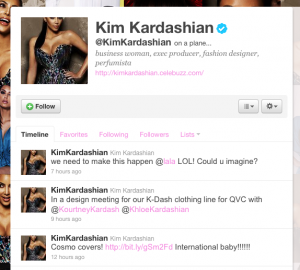UK Regulator To Crack Down On Paid Celeb Tweets
Will celebrity “influencers” like Kim Kardashian or Chelsea Handler soon have to disclose when they’re being paid to promote a product or service on Twitter? This past weekend The Guardian reported that the UK Office of Fair Trading (OFT) “has begun a crackdown on Twitter users and bloggers using their online presence to endorse products […]
Will celebrity “influencers” like Kim Kardashian or Chelsea Handler soon have to disclose when they’re being paid to promote a product or service on Twitter? This past weekend The Guardian reported that the UK Office of Fair Trading (OFT) “has begun a crackdown on Twitter users and bloggers using their online presence to endorse products and companies without clearly stating their relationship with the brand.”

In the US in 2009 the FTC published updated guidelines that require bloggers or celebrities who are endorsing products and services in an online editorial context to disclose that they’re being paid to do so:
The revised Guides also add new examples to illustrate the long standing principle that “material connections” (sometimes payments or free products) between advertisers and endorsers – connections that consumers would not expect – must be disclosed. These examples address what constitutes an endorsement when the message is conveyed by bloggers or other “word-of-mouth” marketers.
The core idea is to reveal when someone’s opinion or statements are being influenced by compensation to remove the veneer of objectivity or independence that might otherwise deceive the public.
These FTC guidelines would seem to equally prohibit paid tweeting in the US without disclosure of the commercial nature of the endorsement. However it’s not clear that these rules are being enforced. Separately the FTC’s requirement that “paid inclusion” or “paid placement” ads be clearly disclosed would also seem to be implicated by celebrity or other paid tweets (although that rule was arguably limited to “search engines”).
While nobody is confused about the nature of a cosmetics or clothing ad in a magazine or on TV featuring a celebrity, there might be some confusion on a site like Twitter, where the stream of tweets appears to be authentic comments or “conversations” about these personalities’ daily lives and activities. One interesting thing to consider is whether disclosure of paid tweets would a) diminish their impact and the overall appeal of the celebrities in question or b) would these high-profile Twitter users would then be disinclined to accept payments for tweeting, fearing that their credibility would be affected?
Related posts:
Contributing authors are invited to create content for Search Engine Land and are chosen for their expertise and contribution to the search community. Our contributors work under the oversight of the editorial staff and contributions are checked for quality and relevance to our readers. Search Engine Land is owned by Semrush. Contributor was not asked to make any direct or indirect mentions of Semrush. The opinions they express are their own.


